The elaborate con that tricked dozens into working for a fake design agency
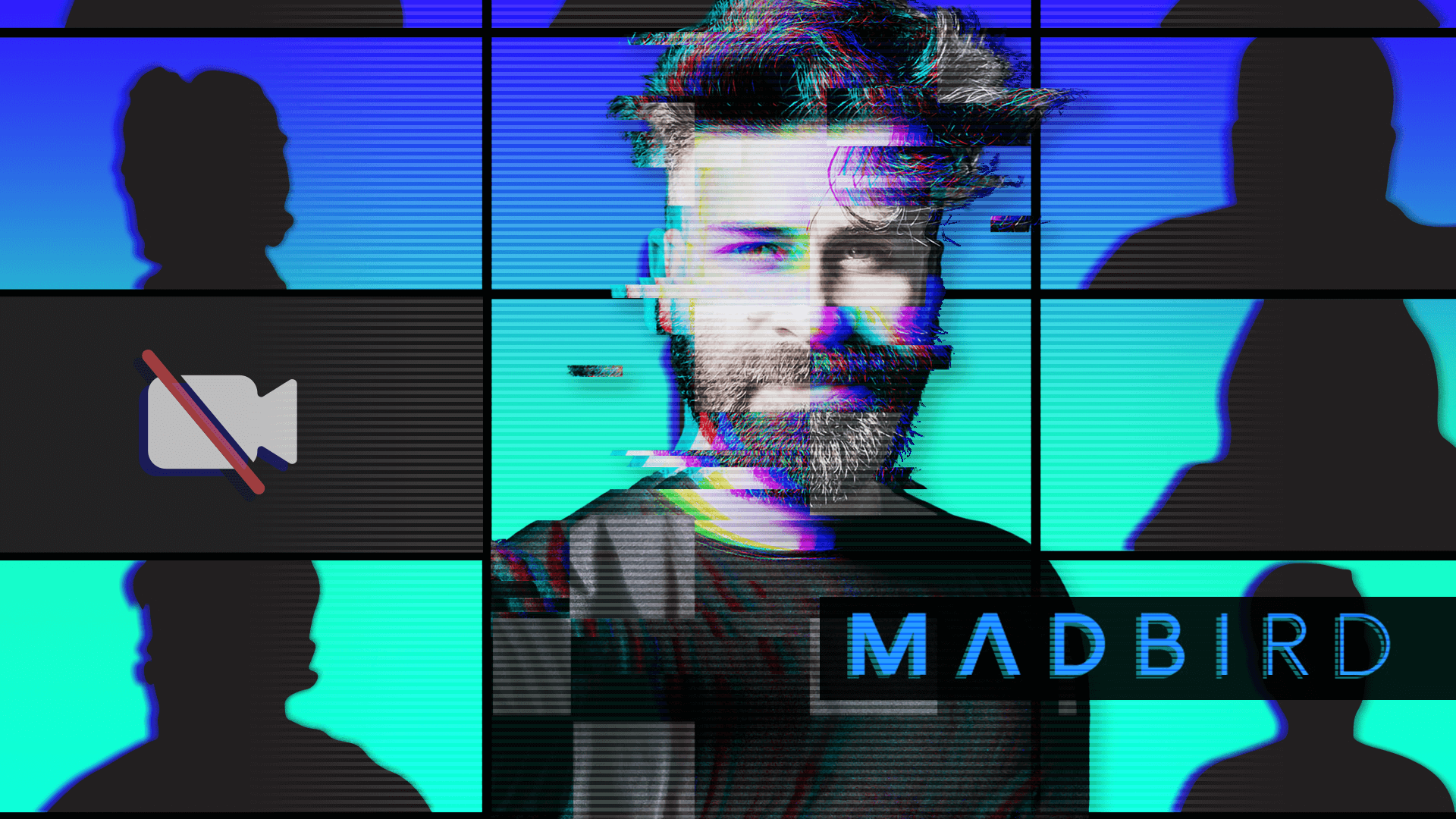
The Zoom call had about 40 people on it - or that's what the people who had logged on thought. The all-staff meeting at the glamorous design agency had been called to welcome the growing company's newest recruits. Its name was Madbird and its dynamic and inspirational boss, Ali Ayad, wanted everyone on the call to be ambitious hustlers - just like him.
But what those who had turned on their cameras didn't know was that some of the others in the meeting weren't real people. Yes, they were listed as participants. Some even had active email accounts and LinkedIn profiles. But their names were made up and their headshots belonged to other people.
The whole thing was fake - the real employees had been "jobfished". The BBC has spent a year investigating what happened.

Chris Doocey, a 27-year-old sales manager based in Manchester, started at Madbird in October 2020, a few months before the Zoom call. He would be working from home, but the pandemic was still raging, so that was normal. Covid had upended Chris's life. It had cost him his last job and was the reason he'd applied for this role at Madbird. The ad described a "human-centred digital design agency born in London, running worldwide". It sounded good.
Madbird hired more than 50 others. Most worked in sales, some in design and some were brought in to supervise. Every new joiner was instructed to work from home - messaging over email and speaking to each other on Zoom.
Days were often long. Jordan Carter from Suffolk, who was 26 at the time, was credited with being one of the hardest working members of Chris's sales team. In five months, he pitched Madbird to 10,000 possible business clients, hoping to win deals to redesign websites or build apps. By January 2021, his work ethic had earned him the title Employee of the Month.
Other staff lived outside the UK. Keen to tap into a global market, Madbird's HR department posted job ads online for an international sales team based out of Dubai. At least a dozen people from Uganda, India, South Africa, the Philippines and elsewhere were hired.
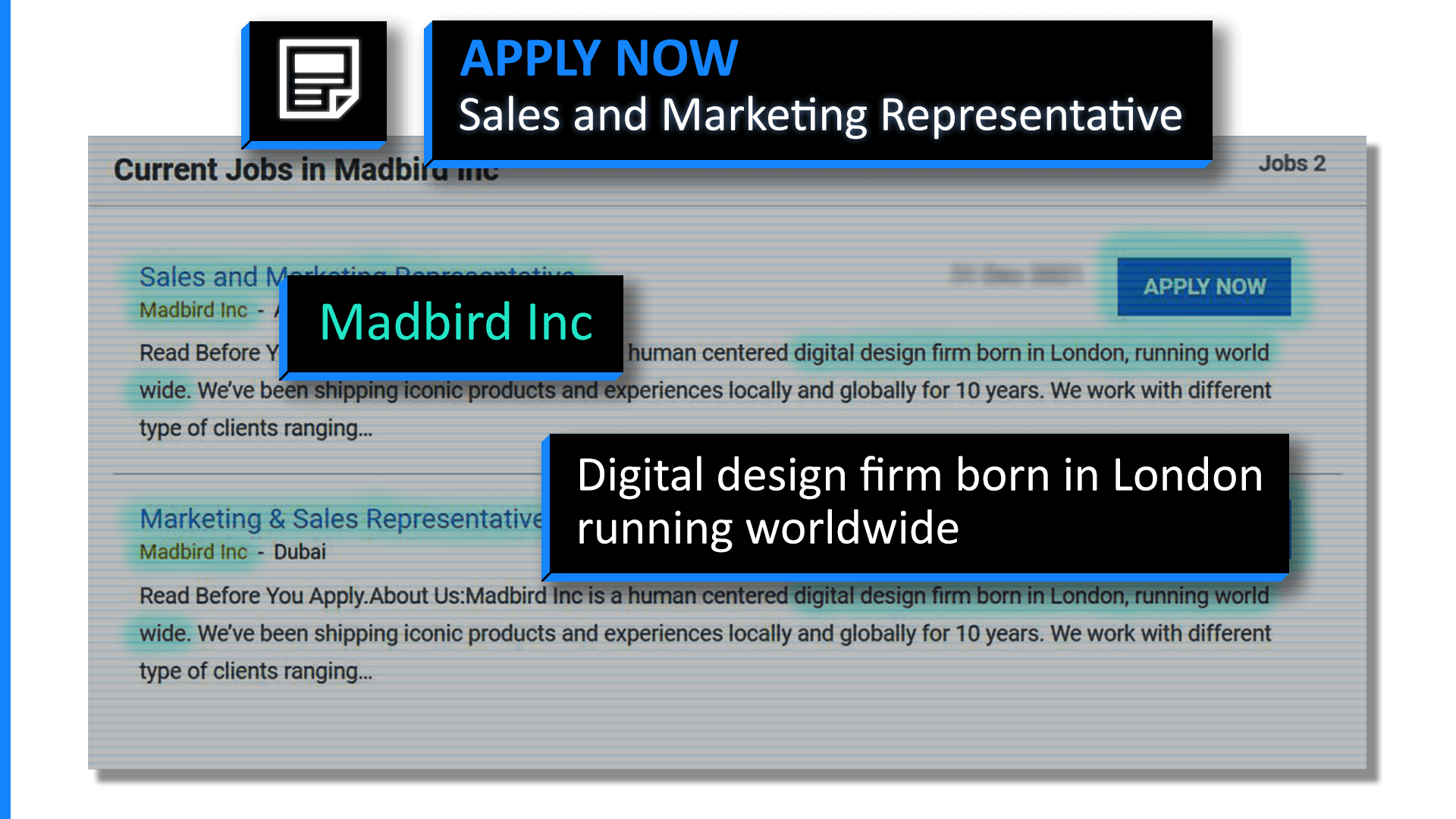
For them, the job represented more than just a pay cheque - but a UK visa too. If they passed their six-month probation period, and met their sales targets, their contracts said Madbird would sponsor them to move to the UK.
Ali Ayad knew what it could mean to make a new life in the UK. He often talked to Madbird staff about his past before settling in London. But there were many versions of his story.
To one person he introduced himself as a Mormon, from Utah in the US. To others, he was from Lebanon, where a difficult childhood had taught him how to be a hustler. Even his name changed. Sometimes he added a second "y" to his surname, spelling it "Ayyad". Other times he signed off as "Alex Ayd".
But some chapters in the story he told people were consistent. Key - above all - was the time he spent as a creative designer at Nike. He told everyone about working at the fashion brand's Oregon headquarters in the US. It was where he'd met Dave Stanfield, Madbird's co-founder.
The stories about Ali's high-flying career didn't seem far-fetched. He was a smooth operator on video calls - intense, charismatic, even appearing caring. He spoke with confidence, sometimes bordering on bullishness. It is how he persuaded at least three people to quit other jobs to work for him.
 Image source, Instagram
Image source, InstagramMadbird's staff had no reason to doubt Ali's Nike stories. And if they did, all they had to do was check his LinkedIn profile. It glowed with lengthy endorsements from former colleagues.
Ali Ayad "floored me with how meaningful and thoughtful his approach was", read one comment - supposedly from a creative director at Nike. "Agencies can be filled with copycats but that's not Ali. He brings originality and authenticity to any project he works on."
And then there was his business partner, Dave Stanfield. At Nike, Ali Ayad was "instrumental" and "one of the best professionals I've ever worked with," read his testimony.
Ali's optimism and energy were contagious. One person he hired compared her new boss to Tom Cruise. But the two people whom Ali compared himself to most often were Steve Jobs and Elon Musk. The tech titans were Ali's idols.
"Elon Musk works 16 hours a day, I'm trying to do 17!" he wrote in one email trying to motivate his team to keep pushing through. And - weighing up another tough business decision - he used a quote often attributed to Steve Jobs. "If you want to make everybody happy, don't be a leader, go sell ice cream."
For months, Madbird's daily business hummed along, more designers were hired to meet the backlog of briefs being negotiated by the sales team.
But even before the truth about Madbird was revealed, its workers had a problem. Because of the unusual way their contracts had been written, they were yet to be paid.

Reporter Catrin Nye exposes Ali Ayad's tangled web of lies and ends up confronting him to get to the truth.
Watch Jobfished on 21 February at 21:00 on BBC Three or BBC iPlayer.

They had all agreed to work on a commission-only basis for the first six months. It was only after they passed their probation period that they would be put on a salary - about £35,000 ($47,300) for most. Until then, they would only earn a percentage of every deal they negotiated. They were all young adults looking for work and living through a pandemic. Many felt they had no choice but to accept the terms in their contracts.
But no deals were ever finalised. By February 2021, not a single client contract had been signed. None of the Madbird staff had been paid a penny.
Some recruits ended up leaving after a few weeks, but many stayed. Many had been there for almost six months - forced to take out credit cards and borrow money from family to keep on top of bills.
The longer you worked at Madbird, the harder it became to leave. What if one of the big deals you'd been working on came through next week? It made no sense to resign just as you were about to finish your probation period. For many, a salary seemed within grasp. Plus, in the middle of the pandemic, jobs were hard to find.
It is obvious now why no-one was paid. Madbird had no money coming in. But that wasn't obvious to new staff. They mistakenly assumed their pay contracts were unique - and that their line managers must have been on salaries. Besides, Madbird was on the cusp of signing a whole bunch of deals. The money was finally coming.
Or that is how it appeared until everything crumbled one afternoon.
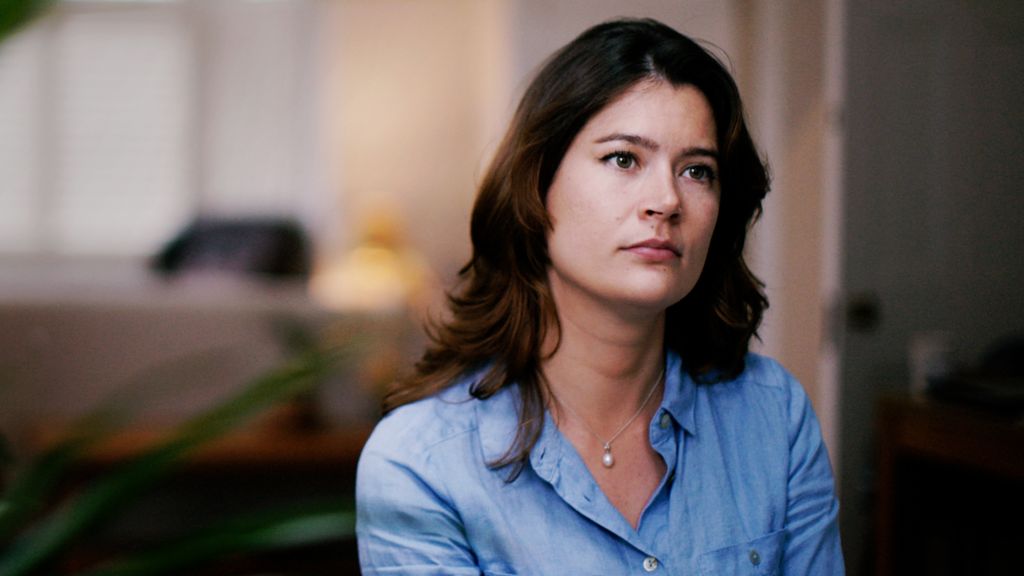
Gemma Brett, a 27-year-old designer from west London, had only been working at Madbird for two weeks when she spotted something strange. Curious about what her commute would be like when the pandemic was over, she searched for the company's office address. The result looked nothing like the videos on Madbird's website of a sleek workspace buzzing with creative-types. Instead, Google Street View showed an upmarket block of flats in London's Kensington.
Gemma contacted an estate agent with a listing at the same address who confirmed her suspicion - the building was purely residential. We later corroborated this by speaking to someone who'd worked in the building for years. They had never seen Ali Ayad. The block of flats was not the global headquarters of a design firm called Madbird.
Gemma shared her discovery with another Madbird employee she had got to know and trust - Antonia Stuart, who was leading the company's expansion into Dubai.
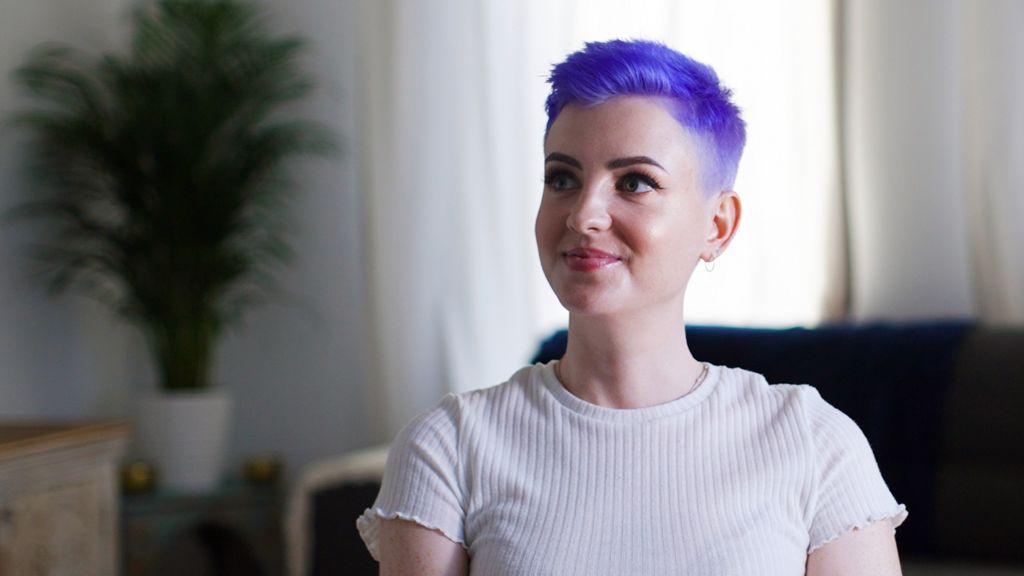
Using online reverse image searches they dug deeper. They found that almost all the work Madbird claimed as its own had been stolen from elsewhere on the internet - and that some of the colleagues they'd been messaging online didn't exist.
They thought about their options. One was to leave quietly without causing a stir. They had no idea who was behind this con, or the scale of it. They were scared. On the other hand, they worried if the truth wasn't exposed innocent staff could end up in trouble if they completed deals for Madbird based on lies. Deals were just days away.
In the end, they decided to send an all-staff email from an alias - Jane Smith.
The email was sent on a busy workday afternoon and accused Madbird's founders of "unethical and immoral" behaviour - including stealing the work of others and "fabricating" team members.
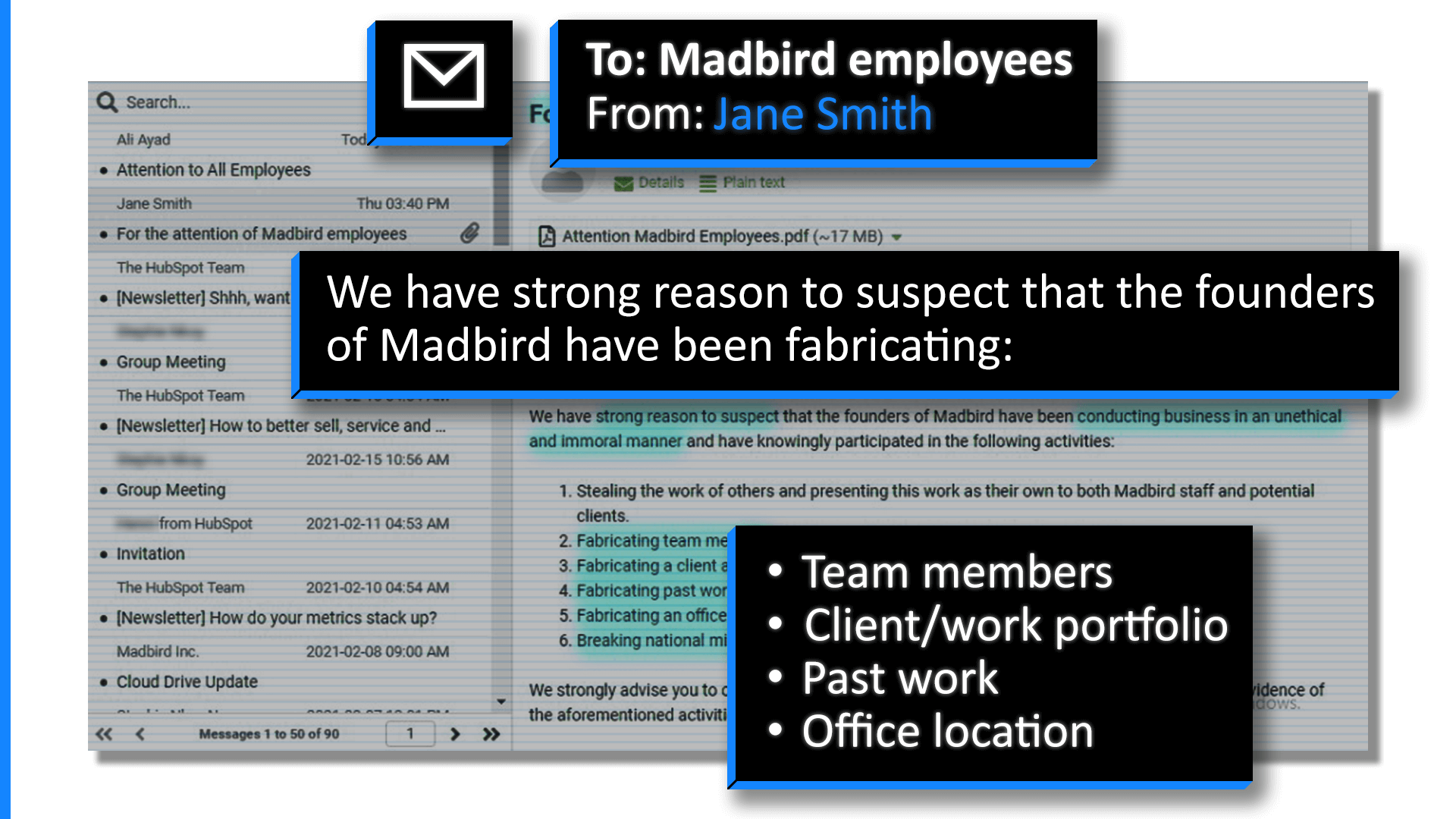
The revelations were devastating for real staff members. Everything they had been doing, it seemed, was built on lies. It now looked like they'd never see any money in return for months of their time and hard work.
It was at this moment that we began our own investigation into Madbird. We corroborated the claims in the Jane Smith email, and went even further.
Lies and stolen profiles
The company had not been "shipping products and experiences locally and globally for 10 years" as it had claimed. In fact, Ali Ayad only registered Madbird with Companies House on the same day he interviewed Chris Doocey to be a sales manager - 23 September 2020.
At least six of the most senior employees profiled by Madbird were fake. Their identities stitched together using photos stolen from random corners of the internet and made-up names. They included Madbird's co-founder, Dave Stanfield - despite him having a LinkedIn profile and Ali referring to him constantly. Some of the duped staff had even received emails from him. Ali told one employee that if they wanted to get in touch with Mr Stanfield they should email him, because he was too busy with projects for Nike to jump on a call.
Using facial recognition technology we were able to match Dave Stanfield's headshot to its actual owner - a Prague-based beehive maker named Michal Kalis. When we tracked Michal down, he confirmed he had never heard of Madbird, Ali Ayad or Dave Stanfield.
Nigel White was another. Someone using his name had even logged into that January Zoom call. But his photo wasn't of a graphic designer - it was a model whose image was one of the first results when you searched for "ginger man" in Getty Images' stock library. His face appeared all over the internet.
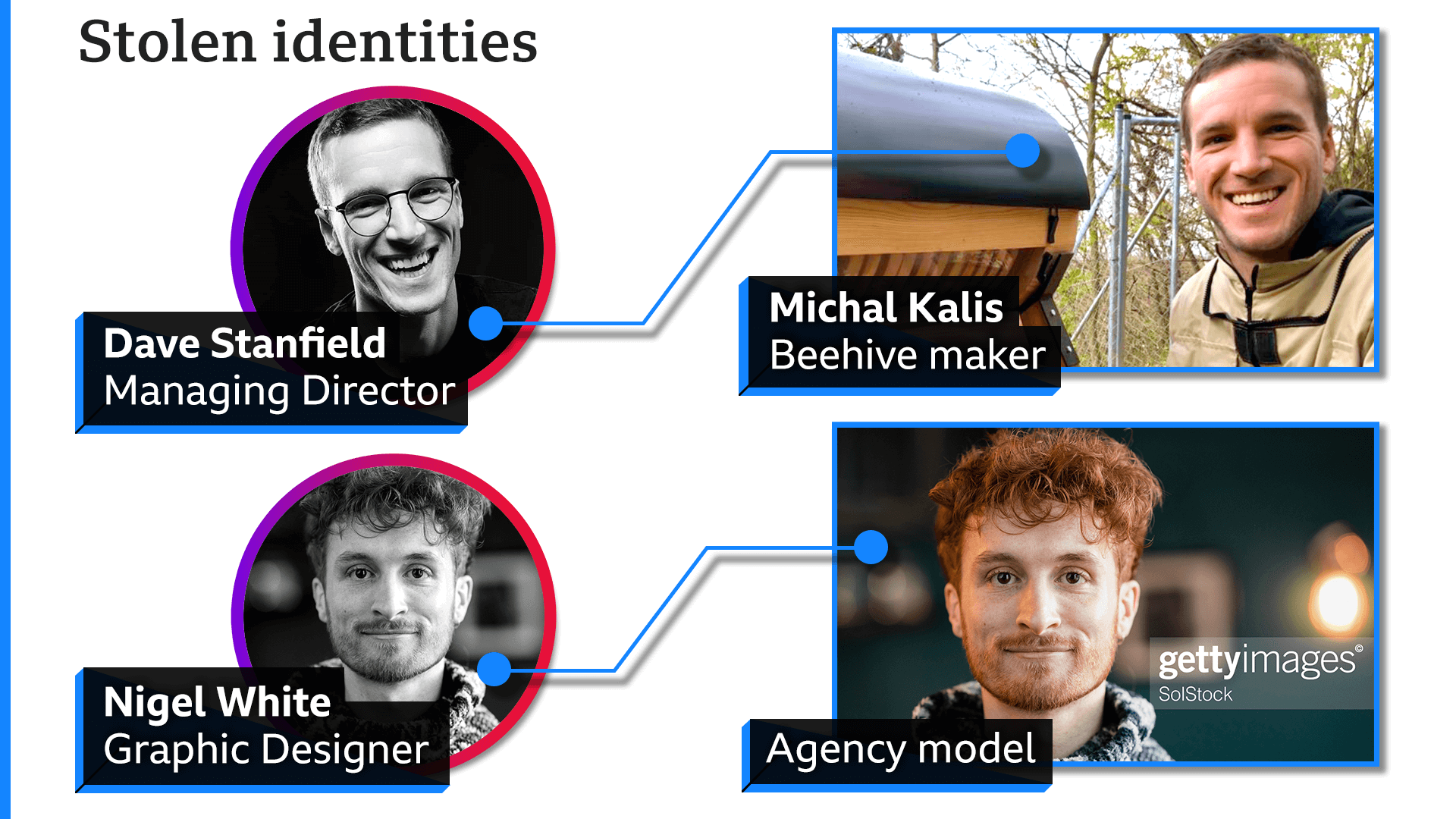
Others were even wackier. A graphic designer, brand growth manager, and marketing manager at Madbird actually turned out to be pictures of a Lebanese doctor, a Spanish actor, and an Italian fashion influencer. All of their photos had been stolen to create fake identities.
We contacted all 42 brands Madbird had listed as former clients - including Nike, Tate, and Toni & Guy. None of those that responded had ever worked with Madbird.
But what about the impressive portfolios of client design work that Madbird had been showcasing with its branding all over it? Lots was ripped from the internet.
One pitch document distributed to Madbird's potential clients had been copied from a London-based design firm called Hatched, in some places lifted word-for-word. When we contacted them, they were shocked. Hatched's bosses told us they had written the pitch document in 2016. The personal bios of their top team had also been stolen and used in the profiles of Madbird's fake staff.
Ali's own backstory crumbled, too. He had never worked for Nike as a "creative lead" in the US, like he claimed. Nike confirmed to us in writing it hadn't employed anyone with his name - or any of his aliases.
The prestigious US and Canadian universities that Ali said he had attended didn't even offer the degrees he claimed to have studied. Neither the University of Southern California nor Concordia University recognised his name among their lists of former students.
And then there was Ali's Instagram account, where he posted updates about his career as a model and influencer to more than 90,000 followers. His social media presence had been one of the reasons many of Madbird's workers admired and trusted him. But the life Ali presented on Instagram was only distantly related to the life he actually lived.
One post in particular caught our attention. It was a photo showing an open issue of GQ magazine, with Ali Ayad modelling a blazer in a full-page ad for Spanish fashion brand Massimo Dutti. "Hustle in silence, let your success make the noise," read the caption.
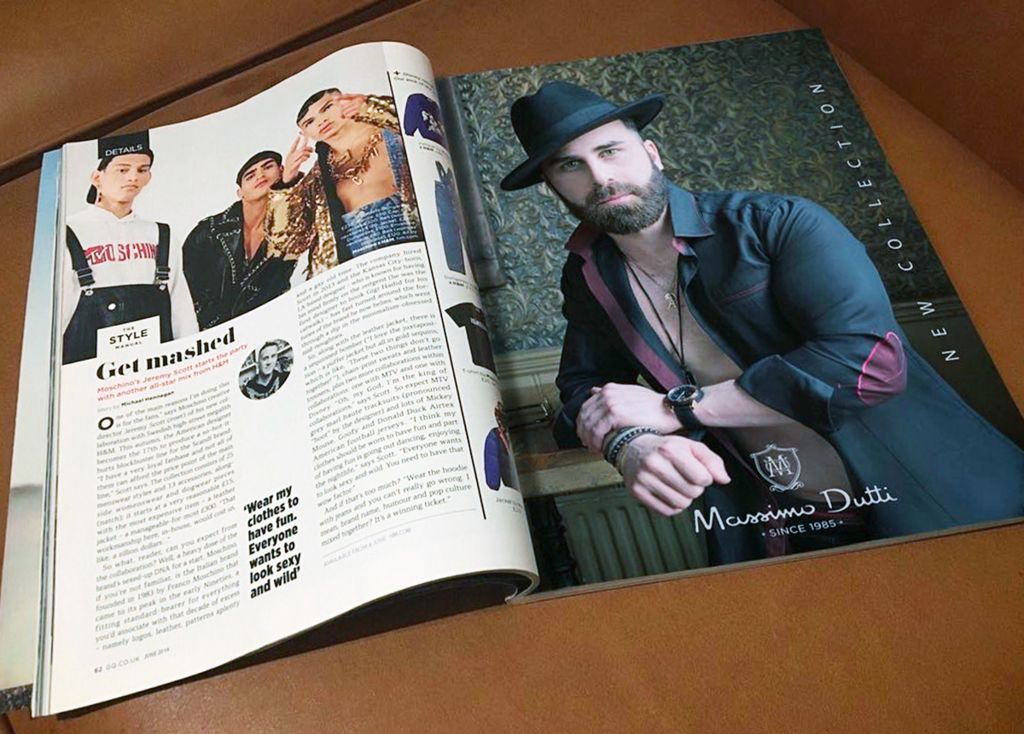 Image source, Instagram/GQ
Image source, Instagram/GQ
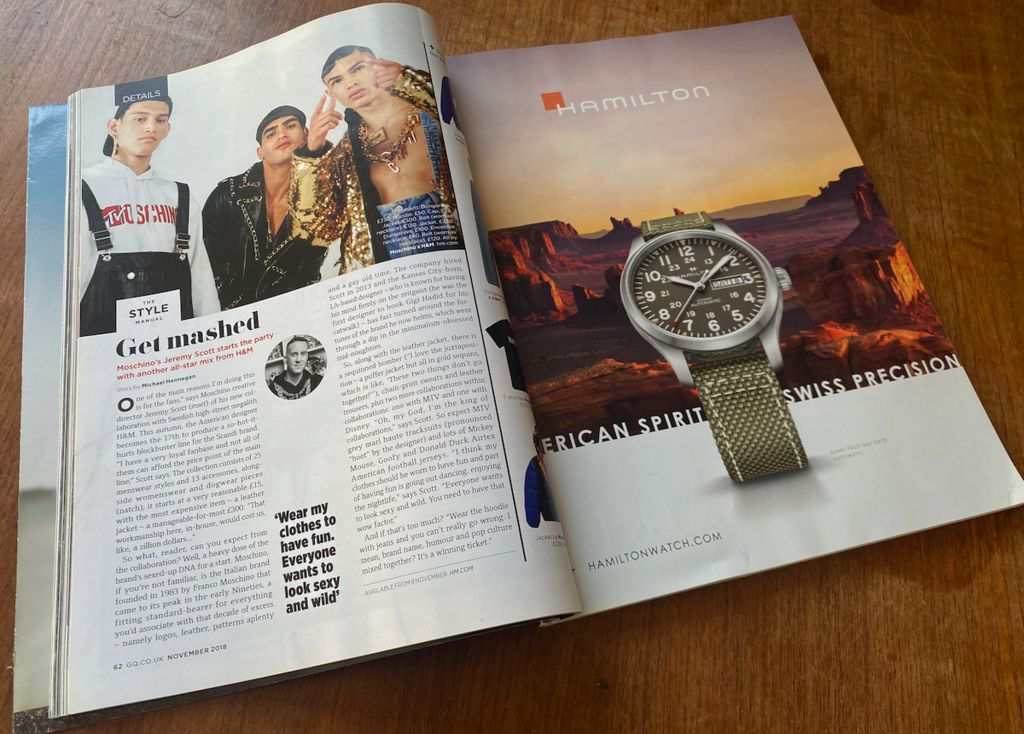 Image source, GQ
Image source, GQBut when we got hold of the GQ issue and opened it to page 63, the photo of Ali wasn't there. It was an advert for a watch. Ali Ayad had never modelled for Massimo Dutti, and he had never been featured in British GQ.
The morning after the allegations landed from Gemma and Antonia in their Jane Smith email, Ali Ayad sent his own email to the Madbird team. "If any of this information came to be true," he wrote, it is as "shocking to me as it's shocking to all of you."
Ali Ayad was claiming complete ignorance. But, as the company's director, he said he would still take full responsibility. He promised to remove Madbird's website and pause all ongoing work "until we fix this".
And then, before he signed off for a final time, a flash of remorse.
"I have put 16 hours every single day for months and done the best that I could to make this work. I should've known better and for that I'm truly sorry."
It was the closest to a meaningful apology that Madbird's staff would get. Ali Ayad soon went quiet. He stopped answering calls from his confused workers and blocked others. Madbird's website went offline, and Ali's LinkedIn profile vanished.
Just like that, the man withdrew into the same digital ether from which he had emerged.

Have you worked with Ali Ayad in the past?
Or have you been jobfished by someone else?
Let us know: jobfished@bbc.co.uk

Madbird's former workers were devastated. Some had spent as long as six months working for no pay. Now they were jobless in the middle of a pandemic, and struggling to even describe what had just happened to them.
Sales manager Chris Doocey had racked up a credit card debt of £10,000 to pay his monthly bills while waiting for his first pay cheque.
Stephie Nkoy-Nyama, from east London, had quit a good job to join Madbird. Her last company had kept her on during the pandemic even while letting others go. She felt pressured by Ali into quitting that job to join his company. "He played us like fools."

And then, there were the international staff. Elvis John, originally from Chennai in India, had at one point been expecting to be on a flight to the UK. He was now just weeks from finishing his six-month probation period and hoping that Ali would sponsor his visa. When the Jane Smith email landed he fell into depression. "My dreams just shattered."
Because Elvis had been doing the job in Dubai the stakes were even higher. He believes that if he had negotiated any deals to completion he would have faced serious legal consequences under Dubai's strict business rules - possibly imprisonment and deportation back to India.
"I don't know if Ali will ever understand what he put us through," says Elvis - who feels the whole thing was treated like a game.
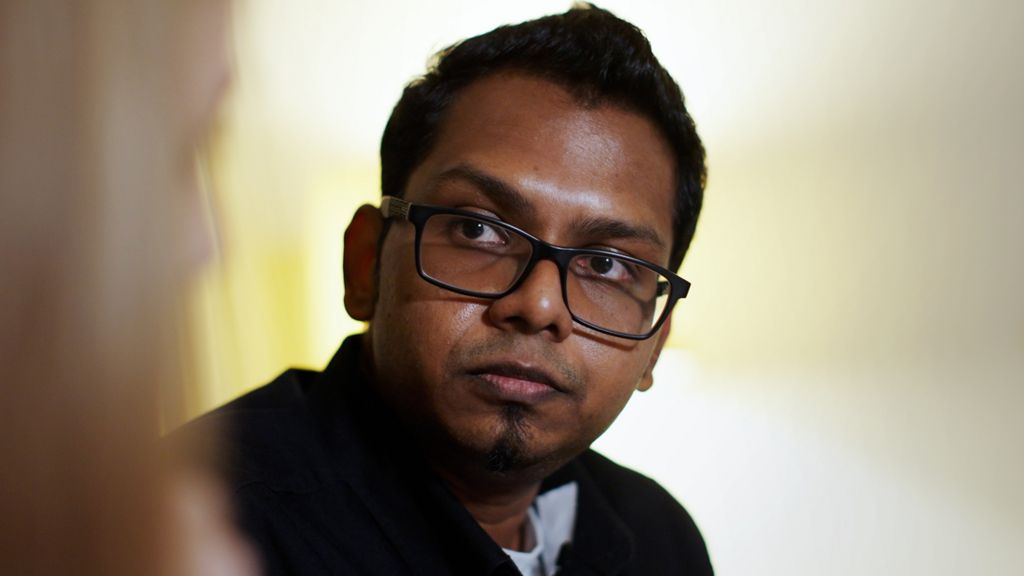
Many were embarrassed to have been caught up in it. Some waited days and even weeks before telling friends and family the truth. And to others, the story was difficult to explain - and always met with questions to which none of the tricked staff had answers.
Three former workers pursued Madbird through an employment tribunal, arguing they should at least be paid minimum wage for their time there. Ali didn't respond to the tribunal in time, and so a judge ordered the trio be paid £19,000 in wages in total. Ali appealed against the decision, which the tribunal upheld. He is now appealing again.
But if he fails once more, that doesn't mean the trio will see any money. The tribunal order was made against the company, not against Ali Ayad as an individual. So if Madbird was insolvent, like Ali said, there was no way the tribunal could force it to pay any of the owed wages. It didn't have the money.
At least one Madbird worker was offered money. James Harris from York had worked there for two weeks as a designer when the revelations came out. Eleven months later he received a cheque in the post for £29.70, retrieved by HMRC's Minimum Wage Unit. Ali had apparently agreed to pay the money in recognition of a few hours' unpaid training James had done.
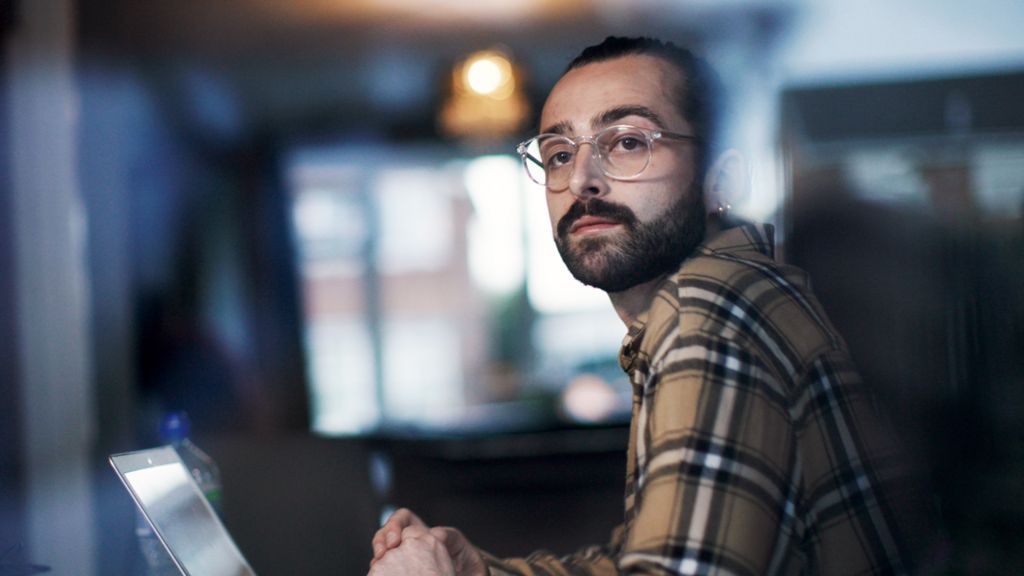
Did Ali Ayad understand the consequences of his actions? For a time Ali said he was going to speak to us to give his version of events. After months of messages back and forth, he eventually agreed to a sit-down, on-camera interview with us at the BBC.
But then, with a day's notice, he dropped out. If we were going to get Ali Ayad's version of events we had no choice but to seek him out.
Confronting Ali
We tracked him down to a west London street one afternoon last October, where we confronted him. He was dressed in a black leather jacket and on his way to an underground station. If he was surprised by us, he didn't show it - choosing at first to ignore our questions. But after a while he couldn't help but speak.
He insisted he had been trying to do something good.
"All I know is that we created opportunities for people. In the midst of Covid."
When we accused him of creating fake identities and stealing other people's work, he got angry.
"I did? How do you know I did?" Was he implying someone else was involved? When we pushed him, he wouldn't name anyone.
There was always the possibility that some anonymous mastermind was behind everything, and it is something we seriously considered. But without any names or help from Ali, it was a path we were unable to pursue.
Ali also insisted that Madbird did have an office. But when we challenged him he backtracked, implying he meant a virtual office. "You don't really have to have computers and stuff, right? It's a digital company."
Eventually, he stopped answering our questions.
We later wrote to give him another chance to respond to the accusations. He replied, conceding that a "couple of points" he was being accused of were true - he wouldn't say which. He also said that the "majority" of the 24 separate points we had put to him in writing were "absurd and incorrect". He said he would respond more fully, but never did.
As long as Ali Ayad refuses to play ball we will never know for certain why he created Madbird. For those who spent the most time with him online, exchanging emails and on video calls, two theories stand out.
One is that the whole thing was an attempt to start an actual business. It may have started out as a lie, but maybe Madbird would eventually start closing real deals and making money. The company, staff believed, was just days from signing on clients when everything fell apart. If the lies hadn't been uncovered, maybe no-one would have ever exposed Madbird's murky origins.
Another explanation is that it was about more than money. Maybe Ali Ayad got a kick out of pretending to be a boss. He genuinely appeared to enjoy his time running Madbird. Job interviews with him often lasted more than an hour. He told stories about how he had turned people's lives around by spotting their talent and giving them a chance. He sent staff links to deep house music to listen to while working. He wanted to be a cool boss - and, for the months Madbird was online, that's how people treated him.
The pandemic changed the way many of us worked - communicating through a screen became the norm. Ali Ayad exploited that. It was as if he wanted to be the next Elon Musk - and, in Madbird, he thought he had found a shortcut. A universe where he would be judged solely by his online presence rather than the offline reality.
And the most shocking part of Ali Ayad's gamble?
The fact that we live in an age where it nearly worked.
Graphic design by Lilly Huynh
Related Topics



No comments